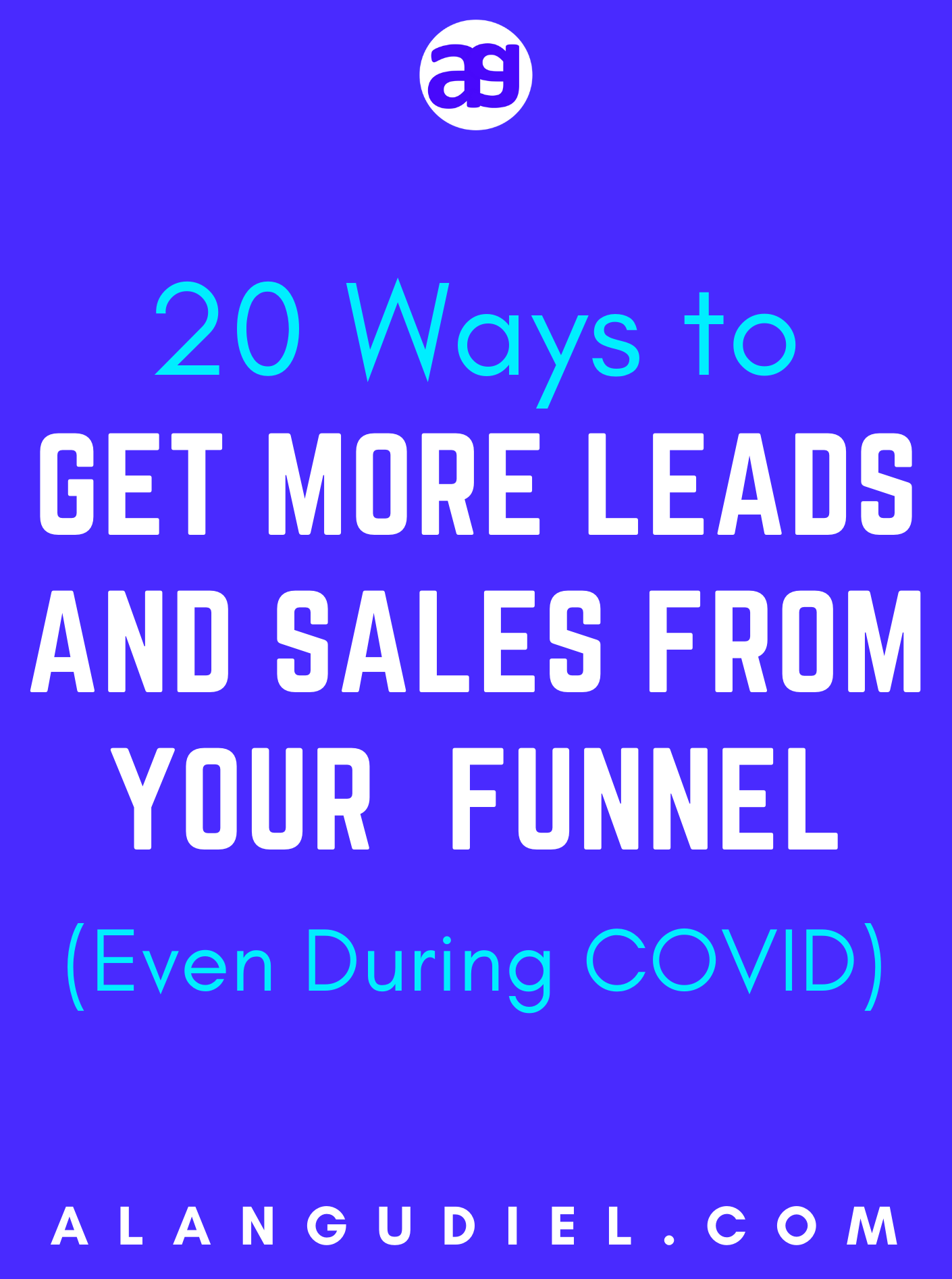You can get laid with lust. But you get married and stay married with trust...Rather than get customers to make sales, it is smarter to make sales to get customers.
Dan Kennedy
No BS Guide to Trust-Based Marketing
In case you haven't already heard, trust is a HUGE factor when it comes to making sales, acquiring clients & customers, and growing any business. In fact, Dan Kennedy [also] goes on to say that every business is actually in the business of selling trust, as opposed to whatever they think they're selling.
For example, did you buy that car or that dog food because of its features, or because you trust it to do what you want it to do. Yes, you may have also trusted other products, but you ultimately chose the one that you trusted MOST to do the job you wanted it to.
Keep in mind that "the job you want it to do" often includes much more than just its primary function. For example, you probably chose that sweater you're wearing, or laptop you're using because you trusted that it would do its job at the right price. Or that it would double as a fashion-statement.
As with buying and most human behavior, trust results much more from psychological factors than from physical features, which means we will discuss everything EXCEPT your fancy bells and whistles.
No matter what you (think you) sell, what you really sell is trust, so let's learn some ways that you can build trust and authority in your space and with your audience. While you probably shouldn't use every single tactic we'll discuss here, you should experiment and find the right mix for your business.
20) DIS-Trust
As always, before we discuss ways to build trust and authority, let's discuss some common business tactics that actually do the opposite. Don't be sad or offended if you employ any of these strategies, as most business do, but just know that there is a better way, and that it's well within your reach.
Availability: Being available anytime or "at the push of a button" may SEEM like a good idea at first; after all, what if a prospect has a sales question at 3AM? However, being widely available, flexible, eager, and/or accommodating actually often works against you because it makes you look desperate, which humans have evolved to specifically NOT like, and consequently not to trust either.
Pushiness / Rushing: While there is definitely a place for sales, and closing, and all that jazz, excessive or artless pushiness can also move you into the desperation category in the mind of your prospects. Right or wrong, leads tend to equate pushiness with neediness with desperation with low-quality, so avoid it.
Sales Trophies: If you have an office and you've won any sales awards, then you're probably proud of them, as well you should be. However, understand that when a gazelle walks into your office and sees the heads of many other gazelles on your wall, they get uneasy. Impress your prospects, not your peers.
Superiority: This last one is a little different but just as important as the rest. Many businesses think / assume / hope that if they have the best and highest-quality widget or service, then they should promote that and customers will flock because of it. Unfortunately, this simply isn't the case. Look around you; is every product the best or highest-quality one? Unlikely. I'll guess that you have those specific products because you like their brand, or commercial, but most of all, because you trust them most to do the job.
Your potential clients are looking for reasons to not trust you. Why give them any?
Chris Ducker
Virtual Freedom
19) Second Hand (Borrowed)
What can you do when you need trust and authority FAST, but you have none of your own? The easy (-ish) answer is to use someone else's.
Harvard degree? Borrowed authority from Harvard. Fancy certification? Borrowed authority from the certifier. Whether you were featured in Forbes, or had/have a famous client, or even if a friend recommended you, all of these are ways you can borrow someone else's credibility to build your own.
While advertising on Instagram does not borrow [any] authority, paying an influencer with 10K followers to post about your brand [most] certainly is.
Of course, some authority sources are easier, faster, or cheaper to access than others, but do what you can to build trust by borrowing someone else's [whenever you can].
18) Association

Little flags usually mean 'don't mess with us'
A similar tactic to build trust is by association. Similar to borrowed authority, trust derived from association is more like the adult/professional version of "who you hang out with."
For example, if you needed to choose between two unknown speakers for your conference, would you choose the speaker with no online footprint or the one who has tons of pictures with Bill Gates and Warren Buffet and The Pope? Right or wrong, you'll probably pick the one with impressive associations.
If you are looking to build trust in your product, service, brand, or self, then consider who or what you can associate with to build trust. Similar to borrowing authority, these can include professional organizations, publications, relevant celebrities, and even your prospect's friend circle.
Make an effort to join, be-friend, associate and "be seen with" the people, groups, and ideas that you want people to think about when they think about you. In other words, build trust by association.
Your past and current client-list can also serve as a strong association point. People love to be able to say that they drive the same car, or drink the same sports drink, or work with the same agency or coach as [insert celebrity client here].
17) Introduction / Mutual Contact
The most effective way to sell anything is word of mouth. Consumers trust the recommendations of their family, friends, and coworkers . They have credibility that you can ever hope to have.
Michael Hyatt
Platform
One of the strongest ways to build trust by borrowing authority AND by association is to be referred to or personally introduced by a mutual contact/friend.
Psychology has long-known that humans naturally like and trust people [who they perceive to be] LIKE THEM. Although people tend to have wide networks, they generally consider everyone they know to be "like them."
This means that people practically automatically trust products, services, brands, and businesses when a friend (aka someone like them) makes a direct suggestion or introduction.
And not only do people trust the people they know, but they will often OVER-trust and go out of their way to buy or use what was suggested, at the risk of seeming impolite. The simple version of this is wearing and pretending to like that ugly sweater your aunt got you for Christmas.
16) LISTEN

Those should help
Now that we've mentioned some easy tactics, let's discuss the hardest one which most salespeople and business owners are notoriously bad at. That trust-building tactic is listening.
Your mom and 1st-grade teacher were right when they told you that "you have two ears and one mouth for a reason." Although their science was off, their point was right, and is also backed by science.
People will tell you that they want money, and cars, and vacations, and all of those things are nice, but experience and science repeatedly show that the most desired (and least acquired) "things" humans want are to be listened to, understood, and appreciated. Lucky for us, simply listening leads to all three.
Even though it sounds like the easiest thing in the world to do, go tell someone about your favorite song or movie or vacation, and count the seconds until their eyes glaze over, or until they say something like "damn, that's crazy." And here's the thing: it's not their fault.
Remember that everyone is the world is permanently tuned to their favorite and only radio station: WIIFM, aka "What's In It For Me?" This means everyone shares the problem of feeling that they are not able to discuss their true opinions, thoughts, and desires with most people.
So give them that rare gift and ACTUALLY LISTEN. Back to the point here, one of the easiest and hardest ways to gain someone's trust is to shut up and listen.
Even the most violent critic will soften and be subdued in the presence of a patient, sympathetic listener who will be silent while the irate fault-finder like a king cobra spews the poison out of his system.
Dale Carnegie
How to Win Friends and Influence People
15) Prescription

Take two of these and call me back in the morning
So let's assume you've gotten past the hard part and you actually listened. So now what? Next come another great opportunity to build trust and authority by prescribing a custom solution.
If you went in for a doctor's visit and the second you walked in, the doctor says "I know what's wrong with you, I see it all the time. Take this" and then they leave, how would you feel?
Now compare that with another visit where the doctor tested your blood, saliva, vision, smelling, hearing, skin, and more. Then , a week later after the lab results come in, your doctor meets with you to tell you what you "have", what your options are, and what he prescribes you do next.
Prescription is the other half of listening, where you take in all of the relevant data, and then prescribe a unique and customized solution to solve the unique problem of that unique person. Even if someone just has a cold, they would still prefer (and trust you more) if you run some tests "to be sure."
No matter what you sell, see where you can add some listening and prescription to your process.
14) A Content Library

Your content is ALREADY in your head. Set it free.
Creating content is useful for many reasons, but especially to build trust and authority. You can think of "content" as anything your target audience might find useful in the form of blog posts (like this one), courses, books, articles, speeches, YouTube videos, podcast episodes, Instagram posts, and more.
You [essentially] want your leads to be able to dive into your world, and spend hours consuming your knowledge. Keep in mind that half the battle is simply having the content, which builds trust even among those who don't read it. Those who DO read/watch/listen/consume it will be wowed by your in-depth knowledge, opinions, and experience.
I know and understand that many people consider creating content a chore, but remember that you don't HAVE to create content; you GET to create it. Without content, all your leads have to judge you by are your website and your personality (if you meet in person).
Leads should have the ability to hear/listen/read your "voice" for at least a few hours. Providing your audience with at least a small content library can and will work wonders to build trust, which soon leads to sales, customers, and clients.
13) Author-ity
Author = author-ity, in most people’s minds
Dan Kennedy
Speak to Sell
Even though we just talked about content, there is one kind of content that stands out among the rest. That mega-trust-building content type is book publishing.
Before your run away thinking that writing a book is "too hard" consider this...it isn't. And even if it does take more time and effort to create than you think (which it will), the benefits still far outweigh any potential negatives. Plus, as with anything, your first anything (book) is always the hardest one.
If you and a competitor are both vying for a client or speaking opportunity, and then you (or your competitor) mails the decision-maker their book on the topic, then it's likely that the search ends there.
Yes, writing a book will take some time, but it will:
1) help you to organize your thoughts, process, and sources
2) be the best business card you ever gave out
and 3) establish or cement your place as an expert in your industry.
12) Eat Your Own Cooking

I make some killer scrambled eggs
You may (or may not) be surprised to know how many businesses I talk to who don't employ their own product or service. For example, coaches may preach the value of coaching when they don't hire any themselves, or ad agencies may preach the value of Facebook ads, while not using them themselves.
To be fair, you don't necessarily ALWAYS have to consume or "do" the thing you sell, but you can easily increase trust by making it apparent that you do. Understandably, most people feel reassured when they see you ("the professional") use the thing that you want them to buy.
An overweight personal trainer may have all the same knowledge and skill as a fit one, and maybe even more, but most prospects will choose the provider who has employed, published content, and gotten results using the thing/idea/product/program that they sell.
11) Demonstration
Regardless of who you are, what you sell or how you sell it, whatever presentation to develop and deliver will be multiplied in power if a compelling seeing-is-believing demonstration can be added.
Dan Kennedy
The No BS Guide to Powerful Presentations
One of my favorite phrases is "I'll believe it when I see it" and it especially applies when you are aiming to build trust. No matter what you sell, your leads want demand to see it "in action."
Some great examples include cleaning detergent commercials where they show you how clothes or carpet goes from filthy and stained, to good as new.
So if you sell water, show people drinking it, and if you sell water bottles, show people drinking from them. Whether you sell a product, service, or anything in between, do your best to show it "is use."
When prospects see "someone" using your widget, they instinctively imagine themselves as using it, so give them that opportunity by showing your widget in action.
10) The Seller
People must buy you before they will buy what you are selling.
Jay Conrad Levinson
Guerrilla Marketing
Even if you offer the best, highest-quality product or service in the world, none of that matters if prospects don't trust YOU. In other words, when someone buys anything, they really buy 1) the seller, and then the thing being sold. We'll call these two the "seller" and the "sold."
The "seller" can be anything including Amazon, Coca-Cola, the NFL, or a human salesperson. Once a prospect or audience has enough trust in the seller, they are likely to buy anything and everything that the seller offers next. At the very least, prospects are much more likely to buy the seller's next offer.
If you trust the NFL to deliver a great product, then you'll probably watch the super bowl. If your 20-year-old Toyota never has problems, then you are likely to buy another one when the time comes.
While most businesses spend 90-100% of their time improving their PRODUCT (the "sold"), you now have a secret weapon that can work much better, which is to market yourself (the "seller").
People don’t just by things from you; they buy you.
Dan Kennedy
The No BS Guide to Powerful Presentations
9) Admit Flaws
Marketers and businesses can often be found doing their very best to cover up, hide, gloss over, or even justify their product's flaws. All of this is because age-old marketing told them that buyers don't like anything negative, so they should only be presented with the positive.
While showing your "best side" seems logical and fair enough, several problems arise when you exclusively show your best side:
1) They don't believe you. Telling your audience that your product is perfect and has no flaws is simply not believable, even if it's true. Consumers are no strangers to marketing, so excessive self-praise can even lead many to believe you're actively hiding something, which causes them to DIS-trust you.
2) The second problem with only showing your best side is that if people DO believe you, then you won't be relatable. If you're a coach and all your marketing is about how great you are, how great business is going, and how well-behaved your kids are, then many of your prospects will feel that you are not like them (that's bad), or some may even resent you out of jealousy.
On the other hand, being up-front about your flaws and even competitors can do wonders to build trust, authority, and relatability. This doesn't mean that you should plaster your flaws everywhere, but make sure to sprinkle some phrases here and there to show that you and your business are human.
A sophisticated client knows that there is good and bad in everything. If you present nothing but the good, he knows you're hiding the bad. He considers that lying and decided you cannot be trusted.
Robert McKee
Storynomics
8) Affinity
Another way to build instant trust is with affinity, aka shared interests. Remember that people ultimately like and trust people LIKE THEMSELVES, which especially revolves around their interests.
For example, if you're having a boring (but polite) conversation with someone at a party, and then you find out that they also have a German Shepherd or that they also love your favorite sports team, or share your birthday. Then, the entire dynamic changes and you suddenly like (and trust) them a lot more.
These potentially shared interests and backgrounds can include sports teams, hometowns, goals, politics, favorite song/movie/car, and much more. Right or wrong, people instantly like and trust people who share their opinions, interests, and background so do what you can to throw out some bait.
Anytime you talk about yourself in a speech, presentation, or whatever, throw out some bait to capture some of these groups. For example sprinkle in stories about that time you went snowboarding or to Bali or to that football game. Add in details of your hometown and quirky upbringing as well.
Even if your audience/listener doesn't like your exact sports team or travel destination, they will see you as somewhat of an equal, and that you're in the coveted position of being "like them."
The short story is that people like, trust, and actively seek out people who share their interests. it doesn't cost you anything extra to share a bit more about yourself to establish some common ground.
Everybody is unconsciously looking for like-minded or comfortably similar folks to huddle with.
Dan Kennedy
No BS Guide to Trust-Based Marketing
7) Longevity

I'd be ok with ending up like him
Here's a straight-forward one that you've seen a million times, which is that some prospects like to know how long you've been in business. A few ways to phrase include "established in 2005" or "10 million burgers sold."
Right or wrong, many customers feel reassured to know that you've been in business for a while, aka that they're not your first. People tend to look at the past when they predict the future, so they will naturally assume that if you've been in business for years, that you're doing something right, and that you will still be there tomorrow.
Just like all the tactics we've mentioned, longevity [works better] in some industries or niches than in others (like banks), but see if you can add some of your longevity into your marketing.
6) Exclusivity and Barriers
The affluent spend money on 2 things you can provide; experience and exclusivity.
Dan Kennedy
The No BS: Marketing to The Affluent
Earlier, we discussed some tactics that build DIS-trust such as 24-hour availability, over-eagerness, pushiness, and other desperation indicators. As you may have guessed, doing the opposite of those things often leads to an increase in trust, despite the instincts of many business owners and marketers.
The point is that adding exclusivity and barriers to becoming your customer/client adds mystique and builds trust by making it look that you are confident and possibly over-booked (anti-desperate).
One common example comes from Facebook's origin story, when they were exclusively for college students. This quasi-exclusivity in-part led to Facebook's explosion once they eased those restrictions.
A few ways you can add barriers to your sales process are with applications, strict + limited hours or client limits (quantity), offering one product with zero variations, and more.
While this works best for higher-end offers, exclusivity and barriers can be injected into any sales process. Clients and customers (and everyone) like feeling like they were special enough to be chosen, so don't take that away from them, and give them a chance to "prove themselves" to you.
I know that placing barriers in-between your customers and their ability to buy may seem scary at first, but think about how special or happy you felt any time you were one of the rare few to get or buy something. So build some barriers and give your clients and customers the gift of feeling special.
5) High Prices

Food, water, shelter, and relationships are the only things worth anything
This one may seem out of left field, but the bottom line is that it works, and it works well. This tactic is to raise your prices, which has many benefits actually, but we'll discuss the trust factor here.
In his book Predictably Irrational, Dan Ariely tells the story of black pearls, which no one bought when they were $1, but everyone bought when they were $100+. The same product in the same year.
If you ask anyone on the street "do you like paying less for things, or more?", I'd be surprised if anything less than 100% of people didn't answer "less." However, in real life, with real money on the line, people often choose to pay more for the exact same products.
There are many factors that go into this psychological quirk, with the most famous being the (incorrect) assumption that "you get what you pay for." The point is that while most businesses scramble to find ways to lower their prices, you'd probably be better served (and sell more) if you RAISE yours.
Another great example is the fact that people pay $10,000+ to attend an author's seminar weekend, when they could have just-as-easily read their book and got all the same information.
When something costs $20 (like a book), people are likely to judge its value by that price, but they will judge and take much more action on the exact same information when they pay MORE for it.
I know this seems counter-intuitive to many business owners, but you are literally doing your clients and customers a favor by charging them more. As nice as it may seem, charging less actually leads to less appreciation and less action from your buyer, so do them a favor and raise your prices.
I once heard a great quote that says "If your friends and family think that your price is fair, then you should double it until they don't" and I tend to agree.
If friends, family, peers, and employees were ever to react to positive effectively to your pricing and your success - an unlikely miracle - but the customer reacts negatively, you will be poor.
Dan Kennedy
The No BS Guide to Pricing Strategy
4) Specified Audience
There is a world of importance behind choosing a niche, but especially in choosing your target customer. For example, if you need to get your car fixed, will you go to the general mechanic, or to the mechanic who specifically serves people in your city, with your type of car, and who loves your pets?
Throughout your marketing, you want to specify your ideal customers and give them a chance to raise their hand and say "hey, that's me." For example, "I help amateur runners who want to run their first marathon" gives your ideal customers a very clear opportunity to say "that's me."
And of course, all of this circles back to trust. Your prospects may trust their local grocery store just fine, but if a new one pops up that specifically serves organic / keto / paleo foods and caters to families, then they may be swayed if they fit that description.
When your marketing clearly tells your ideal customers "I am here to help (people like) YOU and solve YOUR specific problems", then that instantly builds trust, or at least a foot in the door.
Don't be afraid to exclude some customers you could ALSO help, and instead, broadcast and focus on the specific ideal customer you seek and give them the chance to say "hey, that's me!"

Sign up for The 20 Steps to
Optimize Your Funnel For Conversions!
3) Familiarity
Another psychological quirk that you can employ to build trust is that of familiarity. The gist of it is that people can't help but trust things that they see often.
There is an old (and often correct) marketing & sales axiom that states that people need AT LEAST 7 "touches" from an unfamiliar brand until they remember it or trust it enough to buy, with "touches" being any interaction or impression between your brand or product and your prospect.
A similar funny quote goes something like this "Within the first 3 touches, they don't remember you. In touches 4-7, they start to remember and trust you. In touches 8-12 are where most sales take place. And in touches 13+, they'll tell everyone that they've been your biggest fan since day 1."
I probably butchered that quote, but the point stands that your prospects will very likely need to see your offer or brand at least several times before they even consider buying from you.
This is also why companies pay extra to have radio or show hosts record/give/perform/read the ad, because they know the audience will trust the message more from a voice they're familiar with.
With quality assumed, this tactic is more of a quantity factor. So find a way (or ways) to get and stay in front of your ideal customer's eyes as often as possible, especially with a new brand or product.
Listeners have more confidence in a familiar voice. A strange voice carries less conviction.
John Caples
How to Make Your Advertising Make Money
2) Social Proof
Now we've arrived at one of the most common trust-building tactics which is to build social proof. Social proof basically means making it known that your client or customer isn't or won't be alone in their purchase. In other words, you want them to think that "everyone else is already doing it."
While teenagers are often teased for being a particularly "sheep like", the truth is that it is a very normal human trait to [want to] follow the crowd. For example, when you're on Amazon looking to buy, do you go for the one with no reviews, or the one with thousands of 5-star reviews?
That is just one of the ways to establish social proof, with others including "customers served" data, ratings, testimonials, case studies, and even celebrity endorsements. In a way, building social proof even forces your prospects to feel like they'd be left out by NOT buying your widget.
So however you can wing it, make it very clear that your ideal customers (or the people they look up to) are "already" customers, which will in turn attract more of them.
6 major sources of social proof are: customers, experts, celebrities, crowds, friends and certifications.
Bob Bly
The Digital Marketing Handbook
1) Risk Reversal

Looks safe to me
Another trust-building tactic you've definitely seen before is risk-reversal, which is providing any guarantee or other way for your leads to know and feel that buying (from you) poses no risk to them.
A few risk-reversals I've seen include:
1) 100% money-back guarantee, no questions asked
2) "If you're not happy, we'll work with you at no extra cost as long as it takes until you succeed"
3) "We offer a DOUBLE-moneyback guarantee if you're not satisfied"
4) "If you don't like it for any reason we'll refund your money and you can even keep the widget.
Your goal here is to remove any (last) fear and/or hesitation from buying. Your prospect has probably tried to solve this problem before and failed, which is why they are now coming to you. Assure them that everything is going to be ok and that they won't be embarrassed or scammed, no matter what.
The triad of selling – the offer, the close, and the risk reversal segment.
Ray Edwards
Copy That Sells
This post contains affiliate links.
